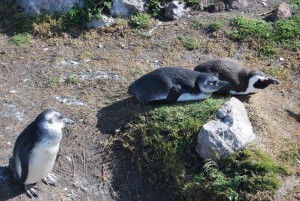 < African penguins at the Stony Point colony in Betty's Bay in the Western Cape[/caption]It's wonderful to hear good news stories and even more so when these stories centre around conservation. Tuna longline fleets and the trawl fishery have been responsible for massive seabird population decreases on a worldwide basis with around 300 000 seabirds being caught each year as bycatch - longlines can extend for over 100 kms with 2 000 to 3 000 baited hooks with fishing going on 22 to 24 hours a day.
In 2006 South Africa became the first country to establish an Albatross Task Force (ATF) team with Argentina, Brazil, Chile, Ecuador, Namibia and Uruguay following suit. The SA ATF team has effectively reduced the hooking of albatross by South African longlining fleets from around 12 000 to 16 000 birds a year to "low hundreds". There has also been a more than 80% reduction in the catching of seabirds from trawl fleets in SA waters, which is indeed a good news story. Well done to BirdLife South Africa.
The African penguin is one of only two seabirds that breed along the South African coast that have been listed globally Endangered by Birdlife International. In the 1950s there were around 150 000 pairs of African penguin in South Africa, however this number has since dropped to 20 000 pairs with one of the reasons for the decline being that African penguins are specialists who only eat anchovies and sardines and these fisheries have declined on the west coast, having shifted to the south coast. The Stony Point colony at Betty’s Bay, however, which numbers around 1 000 breeding pairs is doing well with numbers increasing – another good news story!
< African penguins at the Stony Point colony in Betty's Bay in the Western Cape[/caption]It's wonderful to hear good news stories and even more so when these stories centre around conservation. Tuna longline fleets and the trawl fishery have been responsible for massive seabird population decreases on a worldwide basis with around 300 000 seabirds being caught each year as bycatch - longlines can extend for over 100 kms with 2 000 to 3 000 baited hooks with fishing going on 22 to 24 hours a day.
In 2006 South Africa became the first country to establish an Albatross Task Force (ATF) team with Argentina, Brazil, Chile, Ecuador, Namibia and Uruguay following suit. The SA ATF team has effectively reduced the hooking of albatross by South African longlining fleets from around 12 000 to 16 000 birds a year to "low hundreds". There has also been a more than 80% reduction in the catching of seabirds from trawl fleets in SA waters, which is indeed a good news story. Well done to BirdLife South Africa.
The African penguin is one of only two seabirds that breed along the South African coast that have been listed globally Endangered by Birdlife International. In the 1950s there were around 150 000 pairs of African penguin in South Africa, however this number has since dropped to 20 000 pairs with one of the reasons for the decline being that African penguins are specialists who only eat anchovies and sardines and these fisheries have declined on the west coast, having shifted to the south coast. The Stony Point colony at Betty’s Bay, however, which numbers around 1 000 breeding pairs is doing well with numbers increasing – another good news story!